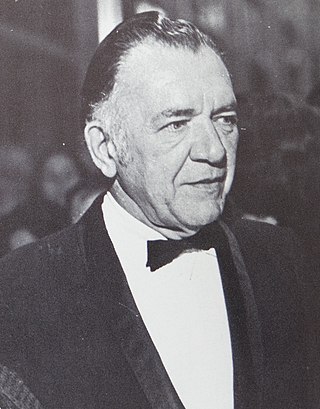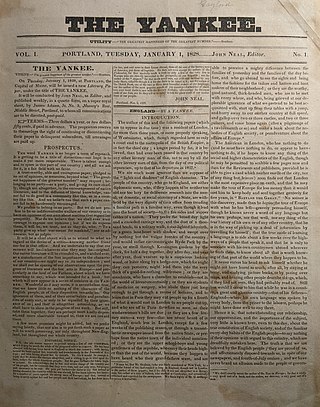Related Research Articles

The Front Page is a Broadway comedy about newspaper reporters on the police beat. Written by former Chicago reporters Ben Hecht and Charles MacArthur, it was first produced in 1928 and has been adapted for the cinema several times. The play entered the public domain in the United States in 2024.

John Augustin Daly was one of the most influential men in American theatre during his lifetime. Drama critic, theatre manager, playwright, and adapter, he became the first recognized stage director in America. He exercised a fierce and tyrannical control over all aspects of his productions. His rules of conduct for actors and actresses imposed heavy fines for late appearances and forgotten lines and earned him the title "the autocrat of the stage." He formed a permanent company in New York and opened Daly's Theatre in New York in 1879, and a second one in London in 1893.

Nathan Lane is an American actor. Since 1975, he has been seen on stage and screen in both comedic and dramatic roles. Lane has received numerous awards, including three Tony Awards, six Drama Desk Awards, two Obie Awards, the Olivier Award, three Emmy Awards, and a Screen Actors Guild Award. Lane received a star on the Hollywood Walk of Fame in 2006 and was inducted into the American Theater Hall of Fame in 2008. In 2010, The New York Times hailed Lane as "the greatest stage entertainer of the decade".

Broadway theatre, or Broadway, is a theatre genre that consists of the theatrical performances presented in 41 professional theaters, each with 500 or more seats, in the Theater District and Lincoln Center along Broadway, in Midtown Manhattan, New York City. Broadway and London's West End together represent the highest commercial level of live theater in the English-speaking world.

Walter Francis Kerr was an American writer and Broadway theatre critic. He also was the writer, lyricist, and/or director of several Broadway plays and musicals as well as the author of several books, generally on the subject of theater and cinema.

Metamora; or, The Last of the Wampanoags is a play written in 1829 by John Augustus Stone. It was first performed December 15, 1829, at the Park Theater in New York City, starring Edwin Forrest.

Theater in the United States is part of the old European theatrical tradition and has been heavily influenced by the British theater. The central hub of the American theater scene is Manhattan, with its divisions of Broadway, Off-Broadway, and Off-Off-Broadway. Many movie and television stars have gotten their big break working in New York productions. Outside New York, many cities have professional regional or resident theater companies that produce their own seasons, with some works being produced regionally with hopes of eventually moving to New York. U.S. theater also has an active community theater culture, which relies mainly on local volunteers who may not be actively pursuing a theatrical career.

Margaret Fleming is an 1890 play by James A. Herne. The play is remarkable because many critics consider it to be the first "modern" drama, a play that focused more on the psychological complexities of its characters and on the role of social determinism the characters' lives than on dramatic or melodramatic retellings.

Justin Brooks Atkinson was an American theatre critic. He worked for The New York Times from 1922 to 1960. In his obituary, the Times called him "the theater's most influential reviewer of his time." Atkinson became a Times theater critic in the 1920s and his reviews became very influential. He insisted on leaving the drama desk during World War II to report on the war, and received the Pulitzer Prize in 1947 for his work as the Moscow correspondent for the Times. He returned to the theater beat in the late 1940s, until his retirement in 1960.

Niblo's Garden was a theater on Broadway and Crosby Street, near Prince Street, in SoHo, Manhattan, New York City. It was established in 1823 as "Columbia Garden" which in 1828 gained the name of the Sans Souci and was later the property of the coffeehouse proprietor and caterer William Niblo. The large theater that evolved in several stages, occupying more and more of the pleasure ground, was twice burned and rebuilt. On September 12, 1866, Niblo's saw the premiere of The Black Crook, considered to be the first piece of musical theater that conforms to the modern notion of a "book musical".

The House of Blue Leaves is a play by American playwright John Guare which premiered Off-Broadway in 1971, and was revived in 1986, both Off-Broadway and on Broadway, and was again revived on Broadway in 2011. The play won the Drama Critics' Circle Award for Best American Play and the Obie Award for Best American Play in 1971. The play is set in 1965, when Pope Paul VI visited New York City.

Elizabeth S. "Lisa" Kron is an American actress and playwright. She is best known for writing the lyrics and book to the musical Fun Home for which she won both the Tony Award for Best Original Score and the Tony Award for Best Book of a Musical. Fun Home was also awarded the Tony Award for Best Musical in 2015 and the 2014 Obie Award for writing for musical theater.
Marguerite Duffy, known professionally as Megan Terry, was an American playwright, screenwriter, and theatre artist.

Performance Network Theatre, founded in 1981, was Ann Arbor, Michigan's premiere professional Equity theatre. It produced a wide variety of dramas, classics, comedies, Pulitzer Prize and Tony award-winners, many of which were World or Michigan Premieres. Its professional season included five to seven main stage productions. Other programming included seasonal productions that ran in repertory over the holiday season, the Northern Writers' Project—a week-long playwriting intensive, children's programming, the Fireside Festival of New Plays, the Open Table Series, the Open Stage series, music and more.
4000 Miles is a dramatic comedy play by Amy Herzog. The play ran Off-Broadway in 2011, and again in 2012. The play was a finalist for the 2013 Pulitzer Prize for Drama.

Elliot Norton was a Boston-based theater critic who was one of the most influential regional theater critics in his 48-year-long career, during which he who wrote 6,000 reviews and became known as "The Dean of American Theatre Critics". Norton practiced a style of criticism known as "play doctoring", where he made suggestions on how to improve a show. Boston was a major pre-Broadway tryout town, and Elliot's criticism was taken seriously by producers, directors and playwrights, including Joshua Logan, Mike Nichols, and Neil Simon.

Under the Gaslight is an 1867 play by Augustin Daly. It was his first successful play, and is a primary example of a melodrama, best known for its suspense scene where a person is tied to railroad tracks as a train approaches, only to be saved from death at the last possible moment.

The Yankee was one of the first cultural publications in the United States, founded and edited by John Neal (1793–1876), and published in Portland, Maine as a weekly periodical and later converted to a longer, monthly format. Its two-year run concluded at the end of 1829. The magazine is considered unique for its independent journalism at the time.
John Waldhorn Gassner was a Hungarian-born American theatre historian, critic, educator, and anthologist.
Prior to his career in social criticism, the American writer Paul Goodman had a prolific career in avant-garde literature, including some 18 works for the stage. His plays, mostly written in the 1940s, were typically experimental. Their professional productions were either unsuccessful or flopped, including the three productions staged with The Living Theatre in the 1950s and one with The American Place Theatre in 1966. His lack of recognition as a litterateur in the 1950s helped drive him to his successful career in social criticism in the 1960s.
References
- ↑ "Meserve, Walter Joseph, Jr. - Encyclopedia.com". www.encyclopedia.com.
- ↑ Ferrara, Miranda H. (20 September 2018). The Writers directory 2005. St. James Press. ISBN 9781558625280 – via Google Books.
- ↑ International Who's who of Authors and Writers. Europa Publications, Taylor & Francis Group. 2008. p. 320.
- ↑ Miller, Jordan Y. (20 September 1965). "An Outline History of American Drama by Walter J. Meserve (review)". Modern Drama. 8 (4): 444. doi:10.1353/mdr.1965.0053. S2CID 191052831 – via Project MUSE.
- ↑ Grimsted, David (1987). "Walter J. Meserve, Heralds of Promise: The Drama of the American People in the Age of Jackson, 1829–1849. Westport, Ct.: Greenwood Press, 1986. xiii + 269 pp. $37.50". The American Historical Review. 92 (4): 1034–1035. doi:10.2307/1864106. JSTOR 1864106.